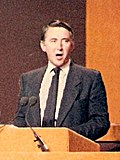1 May 1980 | |||||||||||||||||||||||||||||||||||||
All 36 metropolitan boroughs, 103 out of 296 English districts and all 53 Scottish districts | |||||||||||||||||||||||||||||||||||||
|---|---|---|---|---|---|---|---|---|---|---|---|---|---|---|---|---|---|---|---|---|---|---|---|---|---|---|---|---|---|---|---|---|---|---|---|---|---|
| |||||||||||||||||||||||||||||||||||||
Local elections were held in the United Kingdom in 1980. [1] [2] These were the first annual local elections for the new Conservative Prime Minister Margaret Thatcher. Though the Conservatives in government lost seats, the projected share of the vote was close: Labour Party 42%, Conservative Party 40%, Liberal Party 13%. Labour were still being led by the former prime minister James Callaghan, who resigned later in the year to be succeeded by Michael Foot.
Contents
Labour gained 601 seats, bringing their number of councillors to 8,011. The Conservatives lost 484 seats, leaving them with 11,738 councillors. The Liberal Party gained 90 seats and finished with 1,149 councillors.
Changes in control of councils were as follows:
- Labour gain from no overall control: Amber Valley, Birmingham, Kirklees, Leeds, Peterborough, Rochdale, Walsall, Wolverhampton
- Labour gain from Conservative: Bolton, Bradford, Hyndburn, Oldham, Oxford, Preston, Tamworth, Worcester
- Conservative lose to no overall control: Calderdale, Daventry, Dudley, Great Yarmouth, Hastings, Rushmoor, Shrewsbury and Atcham, Weymouth and Portland
- Liberal gain from Conservative: Adur
- Independent gain from no overall control: Mole Valley


